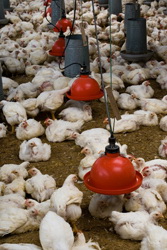Better managing avian influenza outbreaks
Outbreaks of Avian Influenza (AI) have resulted in major losses to the poultry industry, its stakeholders and the EU taxpayer. The continuing threat of Asian H5N1 outbreaks has raised concerns for food security and human health. It has also turned attention to the implications of the crossing of the species barrier and what that means for the emergence of a new human pandemic virus. The 'Generation of information and tools to support the management of the avian influenza crisis in poultry' (FLUAID) project worked on the joint development and application of novel technologies to combat AI infections. FLUAID achieved this goal by bringing together leading European institutes and laboratories in Africa, Asia and Australia. Project partners aimed at delivering diagnostic tools for use in managing outbreaks as well as the application of vaccination-based control measures. Studies focused on the development of prototype vaccines, companion and pen-side diagnostic tests, as well as on transmission in various avian species. Three companion diagnostic tests based on anti-neuraminidase detection systems were produced and evaluated during the project, one of which was successfully commercialised (ID Screen® Influenza N1 Antibody Competition ELISA kit, ID-VET, France). Studies conducted within the FLUAID consortium, identified suitable vaccine candidates against H5 and H7 viruses which could be used as seed strains for an EU vaccine bank. Data generated by the project's studies also indicate that H7N1 vaccination in turkeys produced excellent results with no virus shedding and transmission to vaccinated contact turkeys. Important, additional data demonstrated the absence of detectable virus in the blood or meat of vaccinated turkeys underlining the effectiveness of vaccination in preventing viraemia and meat colonization. Another important FLUAID result showed that H5N2-vaccinated native chickens develop a level of protection sufficient enough to prevent against a productive H5N1 infection. This demonstrates that vaccination with a heterologous vaccine can reduce transmission levels of H5N1 influenza virus thereby reducing the possibility of outbreaks occurring.







